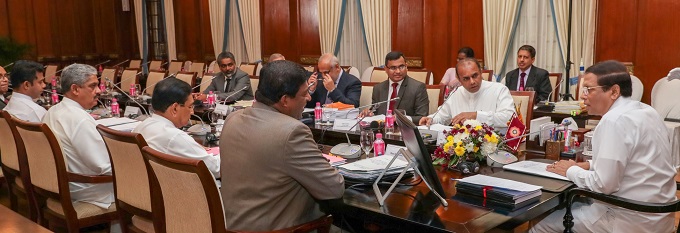By P.K.Balachandran/Daily Express
President Maithripala Sirisena later on Saturday night appointed a four-member Presidential Commission to probe the April 21 Easter Sunday attacks in which nine Lankan Jehadi bombers struck at three churches and three star hotels killing nearly 300 men, women and children, locals as well as foreigners.
This is the second panel to probe into the attacks, the first being a Parliamentary Select Committee (PSC) which ended its hearings last week. Its report is awaited.
According to an Extraordinary Gazette notification, issued on Saturday, the commission will be headed by Court of Appeal Judge Janak de Silva. The other members are Court of Appeal judge Nissanka Bandula Karunarathna and retired Court of Appeal judges Nihal Sunil Rajapaksa and Bandula Kumara Atapattu.
The commission has been entrusted to carry out an impartial and complete investigation on the April 21 bomb explosions and identify persons and organizations directly or indirectly connected to the terrorist attacks.
It has also been tasked with identifying officers and authorities who failed to anticipate that terrorist and extremist activities of this nature would take place within the country and those who failed to perform their duties and did not take proper action.
Post Bomb Riots
The other tasks of the panel are: identifying persons and organizations responsible for demonstrations, acts of sabotage and causing damage to property after the April 21st attacks; and recommending measures about rehabilitating and assisting persons affected, ensuring public safety and preventing recurrence of such incidents.
The commission is required to submit an interim report in three months, a subsequent interim reports in the next two months and the final report in six months.
W.M.M. Adikari, a retired Ministry Secretary, will serve as the Secretary of the commission.
Background
President Sirisena had been against the setting up of the Parliamentary Select Committee (PSC) and its open hearings because he believed that open hearings would compromise national security if what government officials and intelligence officers say are out in the public domain through the mass media.
Nevertheless, the PSC was appointed by the parliament Speaker Karu Jayasuriya going by the wishes of the ruling United National Party (UNP) headed by Prime Minister Ranil Wickremesinghe.
Wickremesinghe ,who had been at daggers drawn with President Sirisena for long, wanted to fix the responsibility for the blasts and the intelligence failure that caused it, on President Sirisena who was in charge of the military as Minister of Defense. It had been Wickremesinghe’s complaint that Sirisena had not been inviting him to meetings of the National Security Council (NSC) which is headed by the President.
When the PSC was constituted, the President’s party, Sri Lanka Freedom Party (SLFP), boycotted its proceedings. So did the Joint Opposition headed by the Sri Lanka Podujana Permuna (SLPP). In effect, the PSC became a committee of the UNP and its allies.
The President himself refused to testify before the PSC saying that its proceedings were mere “drama”. When he did finally testify earlier in the week, he did so not in the parliament’s committee room but in his office outside parliament. He also barred the media from covering it.
However, the media came to learn that he had blamed Prime Minister Wickremesinghe for the lapses which enabled the bomb attacks. Sirisena said that he was opposed to the appointment of Pujith Jayasudara as the Inspector General Police and it was Wickremesinghe who insisted that Jayasundara be appointed.
On the Prime Minister’s charge that he was not being invited to NSC meetings, Sirisena said that he had invited him even though he was kept out when Chandrika Kumaratunga was President.
Be that as it may, the main reason for the appointment of these committees and commissions is to be able to put one’s opponents on the mat by pointing accusing fingers against them in full public view. The line of questioning indicated the political agendas of the various PSC members.
The new Presidential Commission is also likely to have the same political objectives given the politicization of public institutions in Sri Lanka.
Two Significant Departures
However, the Presidential Commission is to have a wider terms of reference which are politically significant. It is to identify persons and organizations responsible for demonstrations, acts of sabotage and causing damage to property after the April 21st attacks.
This is of the greatest importance to the Muslim minority which went through a horrendous experience after the blasts. Sinhala-Buddhist mobs burnt shops and destroyed properties of Muslims in Kurunegala district weeks after the blasts in what appeared to be planned attacks. The police looked the other way as the mobs were on a rampage.
A Muslim government doctor was accused of sterilizing more than 800 Sinhalese women in a bid to restrict the Sinhalese population. A university set up by a Muslim provincial Governor with Middle-Eastern funding was dubbed a Shariah University and forced to stop.
The Presidential Commission is also charged with recommending measures to rehabilitate and assist persons affected by the blasts and the subsequent rioting; ensuring public safety and preventing recurrence of such incidents.
Through this commission, President Sirisena is expecting to burnish his image as a fair-minded non-communal and non-partisan person with a penchant for the welfare of all in a country which is divided on communal and partisan lines. Its proceedings could help in his political career which he is reluctant to end.




























































